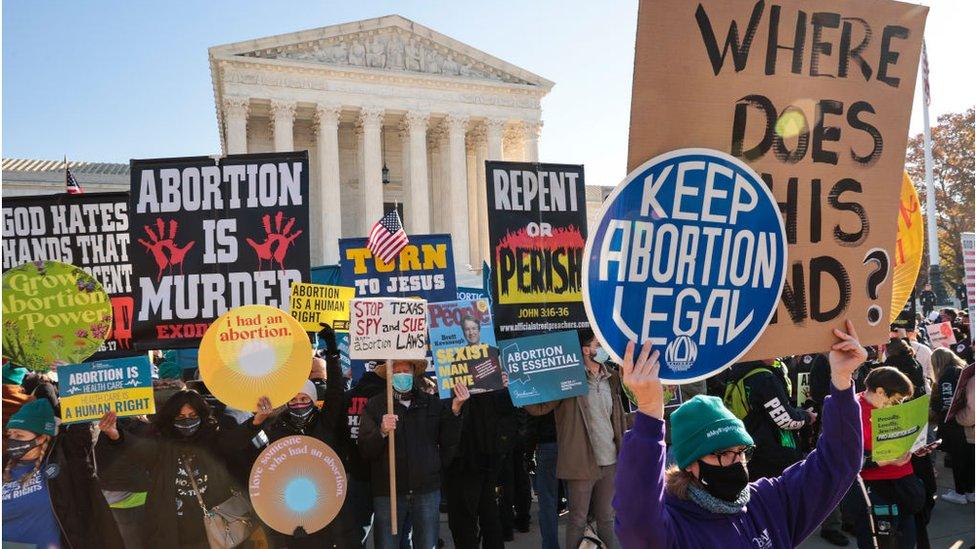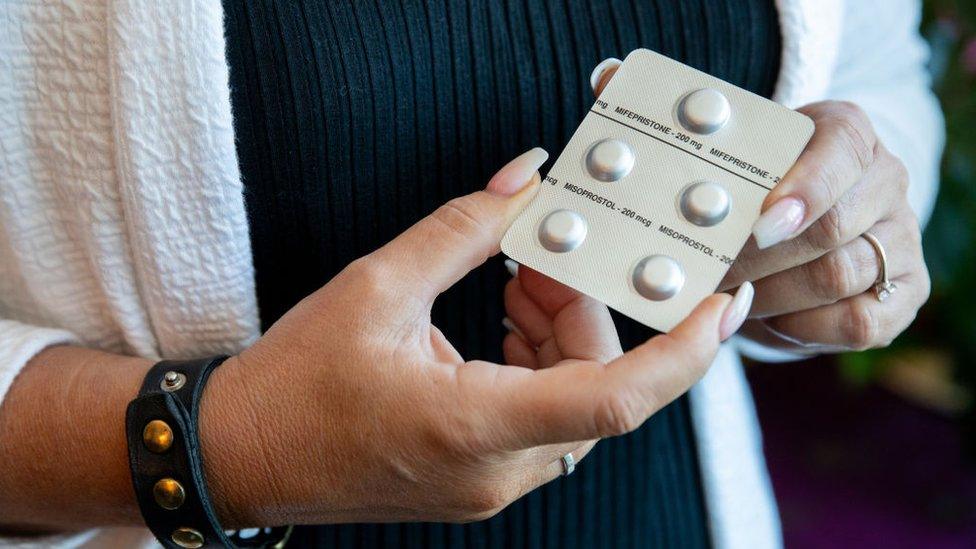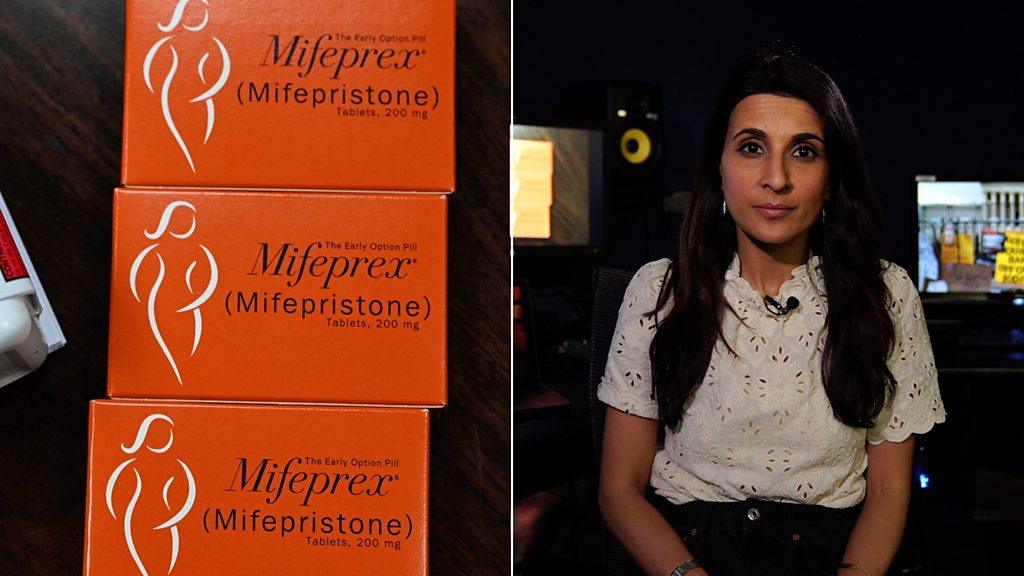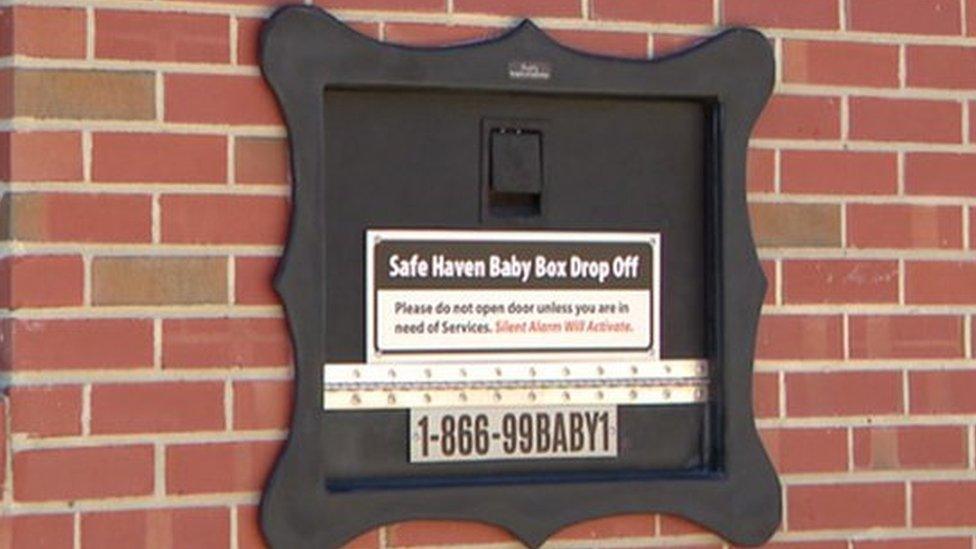Mifepristone: US abortion pill access in doubt after rival rulings
- Published

A Trump-appointed federal judge in Texas has ordered a hold on the longstanding approval of a widely used abortion drug, mifepristone.
But an hour later an Obama-picked judge in Washington state issued a competing ruling, ordering that access to the drug be preserved in 17 states.
The pill has been allowed for over 20 years, and is used in most abortions.
The duelling court orders make it likely that the issue will escalate to the US Supreme Court.
In a 67-page opinion, Judge Matthew Kacsmaryk in Amarillo, Texas, halted the FDA's approval of mifepristone. The ruling will not go into effect for seven days to allow the government time to appeal.
The US Department of Justice confirmed on Friday night it would challenge the Texas ruling.
Judge Kacsmaryk's decision could limit access to the drug for millions of women in the US. Legal analysts said the ruling threatens to upend the entire foundation of America's drug regulatory system.
It comes after the Supreme Court removed constitutional protections for abortion last year, triggering a wave of state-by-state bans.
A lawsuit filed by anti-abortion groups had argued that the drug's safety was never properly studied.
'Barbaric' abortion law nearly killed these Texas women
In his ruling, Judge Kacsmaryk said the Food and Drug Administration (FDA) approval had violated federal rules that allow for accelerated approval of certain drugs. The FDA spent four years reviewing mifepristone before it was approved in 2000.
The judge also said the FDA had failed to consider the "psychological effects" of mifepristone and its safety record.
The FDA's "failure [to account for this] should not be overlooked or understated", his legal opinion continued. The FDA, the American College of Obstetrics and Gynaecologists (ACOG) and other mainstream medical organisations say mifepristone is safe for use.
Allison Whelan, assistant professor in Georgia State University College of Law who filed a legal brief in favour of keeping FDA approval, said the ruling - which refers throughout to "unborn humans", not fetuses - was "inflammatory".
"The politics and ideology motivating Judge Kacsmaryk's decision could not be made any clearer by the inflammatory anti-abortion language used throughout the opinion," she told the BBC.
"He cherry-picks the studies he cites to support his conclusion that abortions are unsafe or harm those who get abortions, without citing the many studies that refute those conclusions."
Meanwhile, Alliance Defending Freedom, a conservative Christian legal advocacy group that represented plaintiffs in the lawsuit, called the Texas ruling "a significant victory" for women and doctors.
Jeanne Mancini, president of another anti-abortion group, March for Life, hailed it as "a major step forward for women and girls".
But an hour after the Texas ruling, another federal judge, this one in Washington state, issued a competing 31-page injunction on a separate case, ordering the FDA to keep the drug on the market in the Democratic-run states that brought the lawsuit.
Washington Attorney General Bob Ferguson called the counter-ruling a "huge win".
Massachusetts Democratic Senator Elizabeth Warren slammed the Texas ruling, tweeting: "We can't let one right-wing extremist overrule women, their doctors, and the scientists."
Mifepristone, part of a two-drug regimen that induces abortions, effectively stops the pregnancy, while the second drug, misoprostol, empties the uterus.
Watch: Abortion pills explained in 60 seconds
It was first approved for the termination of pregnancy up until seven weeks gestation.
In 2016, its approved use was extended to 10 weeks of pregnancy.
Mifepristone is also used to treat women who have suffered miscarriages and Cushing syndrome, a hormone-related condition.
Last week, the Democratic governor of Washington state announced that a three-year supply of mifepristone had been stockpiled by state officials in the event that it became unavailable nationwide.
Days later the Republican governor of neighbouring Idaho signed a new law making "abortion trafficking" illegal. The law makes it a crime for adults to help children leave the state to obtain an abortion without a parent's consent.
Related topics
- Published13 March 2023

- Published24 March 2023

- Published23 January 2019
